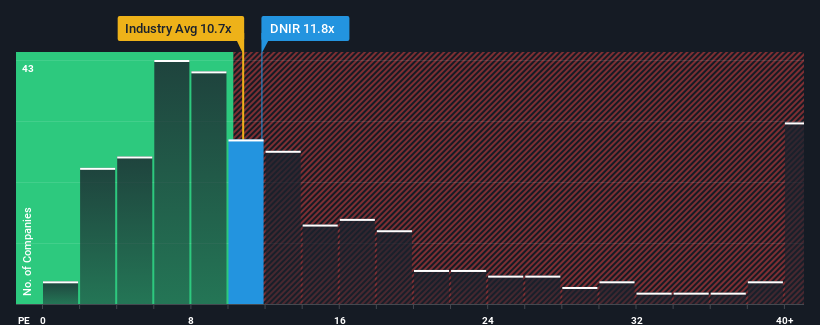- United Arab Emirates
- /
- Insurance
- /
- DFM:DNIR
There's Reason For Concern Over Dubai National Insurance & Reinsurance Co. (P.S.C.)'s (DFM:DNIR) Price

It's not a stretch to say that Dubai National Insurance & Reinsurance Co. (P.S.C.)'s (DFM:DNIR) price-to-earnings (or "P/E") ratio of 11.8x right now seems quite "middle-of-the-road" compared to the market in the United Arab Emirates, where the median P/E ratio is around 13x. Although, it's not wise to simply ignore the P/E without explanation as investors may be disregarding a distinct opportunity or a costly mistake.
Dubai National Insurance & Reinsurance (P.S.C.) has been doing a good job lately as it's been growing earnings at a solid pace. One possibility is that the P/E is moderate because investors think this respectable earnings growth might not be enough to outperform the broader market in the near future. If you like the company, you'd be hoping this isn't the case so that you could potentially pick up some stock while it's not quite in favour.
View our latest analysis for Dubai National Insurance & Reinsurance (P.S.C.)

What Are Growth Metrics Telling Us About The P/E?
The only time you'd be comfortable seeing a P/E like Dubai National Insurance & Reinsurance (P.S.C.)'s is when the company's growth is tracking the market closely.
If we review the last year of earnings growth, the company posted a worthy increase of 13%. Ultimately though, it couldn't turn around the poor performance of the prior period, with EPS shrinking 15% in total over the last three years. So unfortunately, we have to acknowledge that the company has not done a great job of growing earnings over that time.
In contrast to the company, the rest of the market is expected to grow by 3.0% over the next year, which really puts the company's recent medium-term earnings decline into perspective.
With this information, we find it concerning that Dubai National Insurance & Reinsurance (P.S.C.) is trading at a fairly similar P/E to the market. It seems most investors are ignoring the recent poor growth rate and are hoping for a turnaround in the company's business prospects. There's a good chance existing shareholders are setting themselves up for future disappointment if the P/E falls to levels more in line with the recent negative growth rates.
What We Can Learn From Dubai National Insurance & Reinsurance (P.S.C.)'s P/E?
Using the price-to-earnings ratio alone to determine if you should sell your stock isn't sensible, however it can be a practical guide to the company's future prospects.
We've established that Dubai National Insurance & Reinsurance (P.S.C.) currently trades on a higher than expected P/E since its recent earnings have been in decline over the medium-term. Right now we are uncomfortable with the P/E as this earnings performance is unlikely to support a more positive sentiment for long. If recent medium-term earnings trends continue, it will place shareholders' investments at risk and potential investors in danger of paying an unnecessary premium.
It is also worth noting that we have found 2 warning signs for Dubai National Insurance & Reinsurance (P.S.C.) that you need to take into consideration.
If these risks are making you reconsider your opinion on Dubai National Insurance & Reinsurance (P.S.C.), explore our interactive list of high quality stocks to get an idea of what else is out there.
New: Manage All Your Stock Portfolios in One Place
We've created the ultimate portfolio companion for stock investors, and it's free.
• Connect an unlimited number of Portfolios and see your total in one currency
• Be alerted to new Warning Signs or Risks via email or mobile
• Track the Fair Value of your stocks
Have feedback on this article? Concerned about the content? Get in touch with us directly. Alternatively, email editorial-team (at) simplywallst.com.
This article by Simply Wall St is general in nature. We provide commentary based on historical data and analyst forecasts only using an unbiased methodology and our articles are not intended to be financial advice. It does not constitute a recommendation to buy or sell any stock, and does not take account of your objectives, or your financial situation. We aim to bring you long-term focused analysis driven by fundamental data. Note that our analysis may not factor in the latest price-sensitive company announcements or qualitative material. Simply Wall St has no position in any stocks mentioned.
About DFM:DNIR
Dubai National Insurance & Reinsurance (P.S.C.)
Dubai National Insurance & Reinsurance Co.
Flawless balance sheet and slightly overvalued.
Market Insights
Community Narratives




